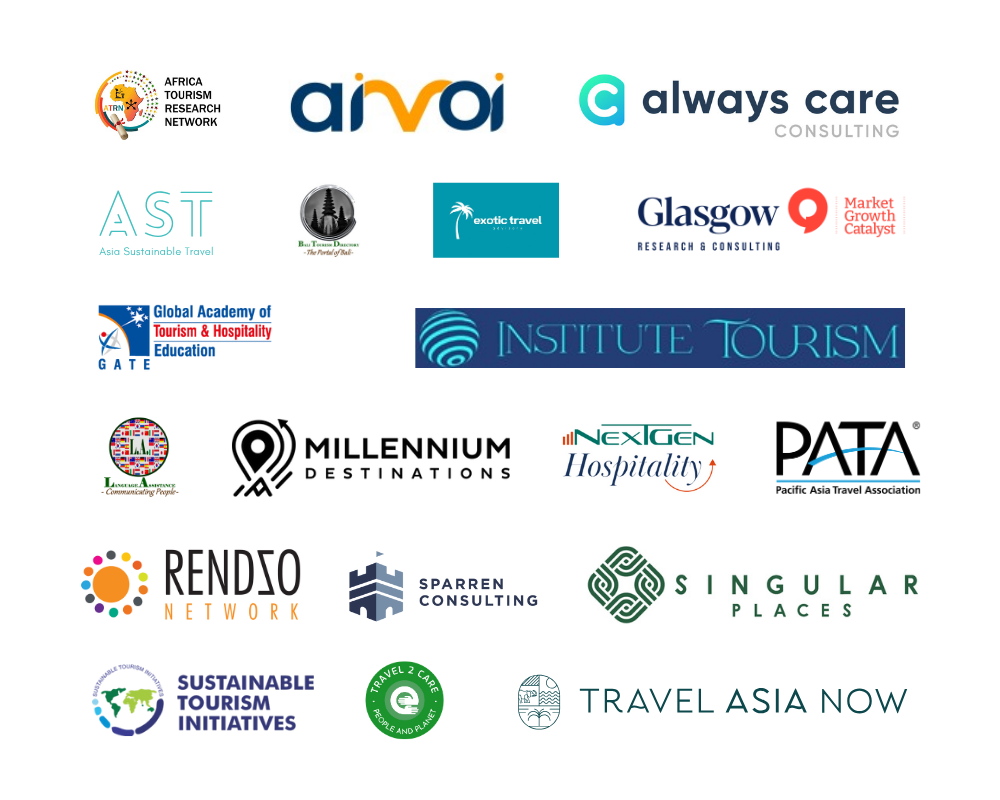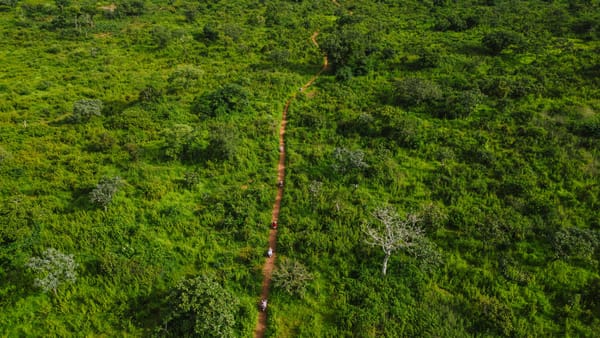A Meaningful Pacific Asia Tourism Economy – PATA's Vision


Dear reader,
Many cities in Spain, France, Germany and other Central and Southern European countries are experiencing the hottest temperatures in early July, measuring since the beginning of meteorological records. Even the Eiffel Tower had to close because of the heat in Paris. At the same time, Northern Europe is experiencing one of the coldest summers on record.
Following similar record-breaking heatwaves last year, visitors to Spain, Greece, etc. will have learned by now that the old summer holidays on the Costa Brava or on Mykonos are not a good idea anymore, and many will not return next year.
Political turmoil and outright criminal acts breaking international laws result in an increase in no-fly zones, making air transport more expensive and tiresome. Staff shortages disrupt transportation infrastructures for goods and people even more.
At the same time, influential organisations like the Boston Consulting Group (BCG) are happily projecting that “Leisure Travel is set to triple in value over the next 15 years”, reaffirming the industry that everything is fine and there is no reason to embrace Creative Destruction (Schumpeter) and react to Climate change, new technologies and the increasing destruction of old business models. BCG sees an extra 10 trillion USD spent in 2035 compared to 2024, a projection which can only be described as toxic.
Meaningful Tourism is not nice-to-have; Meaningful Tourism (with a capital “M”) is the necessary reaction for destinations, companies and organisations to survive in the tourism ecosystem at least for the coming decades. Stopping the usage of plastic straws and offering one night in a homestay as an authentic experience will not do the trick. Barcelona might soon fondly remember the times of “overtourism” in summer, when it was not just too hot to walk along Las Ramblas. There are ways to slow down the problematic development. Smart cities, sponge cities, green cities with vertical gardens are all existing concepts, if only they would be funded and brought into reality.

Your humble editor is happy and proud that the Meaningful Tourism Centre is developing a growing community of experts who are providing Meaningful Tourism Transformational Game Workshops around the world. These experts have a wide range of skills and experiences which can be used for the Implementation Support of Meaningful Tourism strategies in many different forms. MTC has made the information about such offers easy to understand and use with the introduction of the Meaningful Tourism Expert Skills and Experiences Matrix, which is available after the official start during the PATA Meaningful Tourism webinar on Tuesday, July 8, 2025, on https://meaningfultourismcentre.org. PATA members will also find it in the Meaningful Tourism Economy PATA Resources Kit on https://PATA.org. For more information on the Matrix, please refer to the MTC News section below.
About the PATA Webinar, you will find more information in the “Events” section below, which also includes details about two Meaningful Tourism Transformational Game Workshops. These workshops will take place at the end of August in Bangkok, in conjunction with the PATA Travel Mart, and at the beginning of November in London, in conjunction with the WTM. The early bird catches the worm, but the early booking of one of the 30 available seats catches the Super Early Bird discounted fee.
Dear reader, your humble editor hopes that you noticed the new look of the Meaningful Tourism Weekly. In the coming weeks, we will improve the form, content and usability even further, with tags and other functionalities helping you to navigate the texts and find the information you are looking for in the current and previous editions and also with a new “library” offering exclusive information and tools for a small fee. The main content will of course remain free to read for all subscribers.
The uplift is due to the cooperation between MTC and Travel Asia Now, starting with this edition. TAN is the brainchild of its founder and publisher, Rhea Vitto Tabora, who is also our trainer for the Philippines and featured in this week's trainer portrait.
You can also meet her live in the coming week, as Rhea is also one of the four speakers of MTC on July 8th during the PATA Webinar on Meaningful Tourism in the Asia-Pacific region.
As always, all best wishes from Prof. Dr. Wolfgang Georg Arlt and the entire Meaningful Tourism Weekly team in Kathmandu and in Manila!


Tourism On the Edge: Nepal’s Never-Ending Struggle
By Manisha Pudasaini
Nepal entered the global tourism stage relatively late compared to other popular destinations. Nepal began welcoming international visitors after the end of the Rana regime in 1951, marking the start of its efforts to develop tourism as a key part of the national economy.
Nepal’s first major tourism campaign, Visit Nepal 1998, aimed to showcase its landscapes, culture, and hospitality. While it initially showed promise, progress was disrupted by the Nepalese Civil War (1996–2006). Promoting tourism during a violent internal conflict was both a bold and urgent attempt to keep Nepal on the global map.
After the conflict, the sector began a slow recovery, hindered by political instability and strikes. The Visit Nepal Year 2011 campaign also fell short due to ongoing issues with infrastructure and governance. In 2015, just as momentum returned, the devastating Gorkha Earthquake struck, claiming thousands of lives and damaging heritage sites. Later that year, a border blockade by India led to fuel shortages and transport problems, further damaging Nepal’s reputation as a reliable and safe tourist destination.
In 2020, Nepal made a renewed attempt to revive the sector with the Visit Nepal 2020 campaign. Optimism ran high, but the global outbreak of COVID-19 brought international travel to a near-complete halt. Once again, efforts to reposition Nepal as a travel destination were derailed by events beyond its control.
A Shared Global Vulnerability
Nepal is not alone in facing the fragility of tourism in the face of conflict and crisis. In the late 1980s and early 1990s, the Gulf War severely disrupted tourism in the Middle East. Sanctions, political unrest, and economic instability contributed to a steep decline in travel to the region. For example, in Iraq, tourism’s contribution to GDP dropped from 4.43 percent in 1980 to a mere 0.003 percent by 1999 (Ahmed et al., 2020). Rising oil prices and inflation during the war further discouraged travel across Europe and Asia.
Today, similar tensions are resurfacing. Following escalations between India and Pakistan, new conflicts in the Middle East are causing renewed global concern. As major transit hubs like Qatar face potential disruptions, global travel routes may be affected. In such climates, travellers prioritize safety, and tourism tends to decline sharply. Countries like Nepal, which rely heavily on international tourism, are particularly exposed.
Building Forward with Purpose
In the face of growing global instability and shifting travel patterns, Nepal must strengthen its focus on regional tourism to ensure continuity and resilience in the sector. Travellers from neighbouring countries such as India, China, and other South Asian nations offer significant potential, particularly as long-haul travel becomes more complicated due to geopolitical tensions and disruptions in major transit hubs. Religious tourism, in particular, presents a valuable opportunity, as Nepal is home to a rich array of sacred sites that hold deep cultural and spiritual significance for regional visitors.

The ongoing “Visit Nepal Year 2025” declared by China, in recognition of 70 years of diplomatic ties, provides a strategic platform to strengthen bilateral tourism and cultural exchange. Nepal Tourism Board should actively coordinate efforts, monitor the progress of this campaign, and promote destinations through targeted digital marketing and cross-border collaborations. Additionally, pursuing globally recognized sustainability certifications such as GSTC can increase Nepal’s credibility, attract eco-conscious travellers, and position the country as a responsible tourism destination in the region.
To support long-term resilience, Nepal must prioritize domestic tourism as a foundation for an inclusive and self-sustaining tourism economy. Encouraging Nepalese to explore destinations within their own country can help diversify visitor flows and support the sector during international disruptions. This involves developing new sites across the Himalayan, Hilly, and Terai regions, supported by effective branding, improved infrastructure, and quality services.
Adventure tourism, cultural experiences, and nature-based activities such as trekking and hiking can appeal to both domestic and regional tourists, particularly younger and urban travellers seeking meaningful experiences. Community-based tourism and digital promotion can ensure local benefits while preserving cultural heritage. By strengthening domestic tourism and attracting regional visitors, Nepal can build a more resilient tourism sector and promote long-term national development.
The author completed her Master's degree in Development Studies at Kathmandu University. She has a keen interest in migration, tourism, and sustainable livelihoods, including Meaningful Tourism. Meaningful Tourism Weekly is thankful for the permission to publish this article, which is also available in New Spotlight News Magazine (Nepal).

Denial is no solution if locals and visitors complain
By Prof. Dr. Wolfgang Georg Arlt
A few days ago, Andre Gomes, the Tourism Chief of the Algarve Tourism Board RTA, refuted in an interview with the Algarve News public criticism that the Algarve has become too expensive for Portuguese domestic tourists and for the local inhabitants.
Travel agents had reported that Portuguese travellers would increasingly seek wallet-friendlier destinations abroad instead of the most important leisure tourism area in the country.
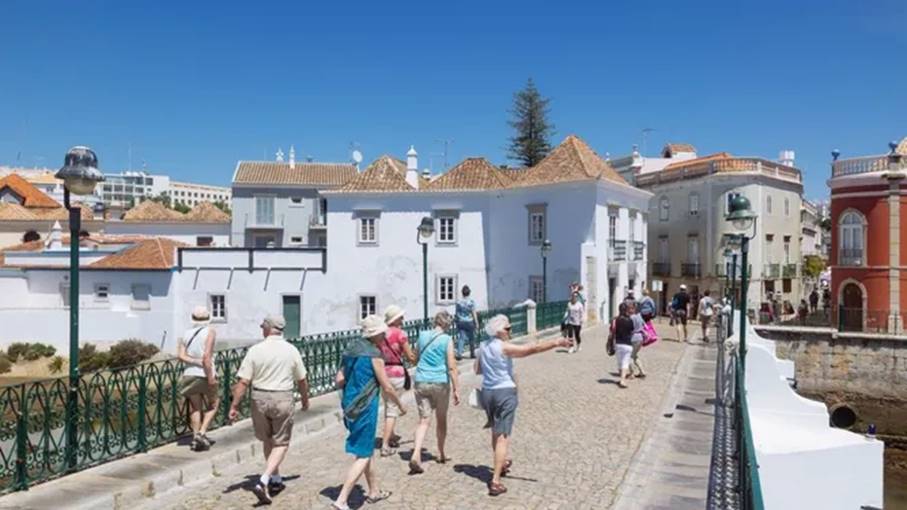
What arguments did Gomes use?
a. Statistics showing that the number of Portuguese visitors in the Algarve has actually been increasing.
b. In a British report, the Algarve was ranked as the world’s most competitive holiday destination. In terms of value for money, according to the 2025 Holiday Money Report by the UK’s Post Office, the head of the Algarve tourism board (RTA) pointed out.
c. A wide range of accommodations and services is available.
d. The Algarve has been given the title “Trusted Brand” several times in the tourism region category.
e. Tourism statistics underestimate the true domestic travel numbers as smaller local rentals are often excluded.
f. 84% of Portuguese visitors plan to return to the Algarve within five years, and more than 90% would recommend it to others. This last one is one of the oldest tricks of DMOs: Asking the tourists who are there without considering all those who did not come in the first place.
The locals and long-time visitors speak however about very different things than statistics and awards, but complain instead about worsening violence, drunken excesses and unruly behaviour in Albufeira, one of the hotspots, seeing the town reduced to a stag party or hen do destination where ‘anything goes’ including urinating in public and drunken tourists running around naked in the city center and public sex acts in broad daylight.
Not only are other tourism market segments pushed away; even regular visitors stop coming, as reported in local newspapers, being quoted as saying “we will not return to Albufeira as the old town has lost its charm for families, couples and indeed elderly visitors.”
At the same time, the prices for real estate in the Algarve are reported to have risen by 30% within a year, with foreigners buying up many properties.
Following Meaningful Tourism principles, all stakeholders need both objective benefits and subjective satisfaction to ensure sustainable tourism development. Denial and hiding behind statistics and awards instead of taking the frustration of stakeholders seriously is not a solution.
The municipality of Albufeira is now planning to publish a Code of Conduct. However, CCTV cameras installed previously have not helped change the behaviour of the mostly British young visitors. Zoning the city for different usages and, for example, learning from British tourism hotspots, which stop supermarkets from selling alcohol in the evening and increase prices in bars and restaurants after dinner time, might do a better job. Most importantly, solutions have to be found for an alignment of interests in a dialogue process, including all stakeholders, not by telling locals and concerned visitors that they are wrong.
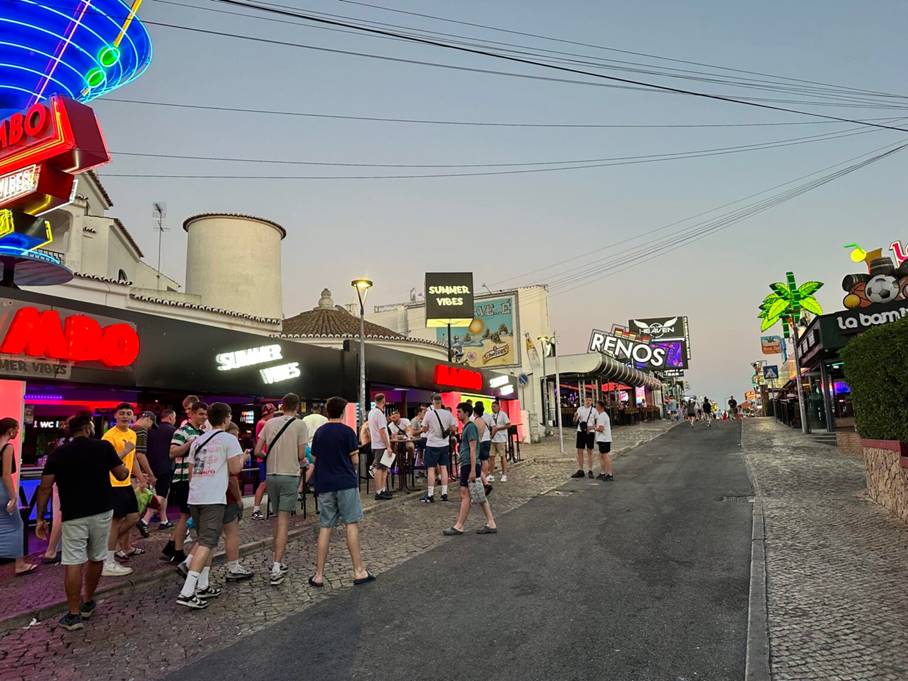

Meet the Trainer for the Meaningful Tourism Transformative Game Workshop

Rhea Vitto Tabora is the Founding Editor-in-Chief of Travel Asia Now, a digital publication inspiring meaningful and mindful exploration of Asia, and the Co-Founder of Asia Sustainable Travel, a media and intelligence company delivering sustainability content and Asia-focused marketing solutions for hospitality and travel brands.
With 20+ years of experience in hospitality, PR, branding, sales, and marketing across Vietnam, Indonesia, and the Philippines, Rhea helps businesses through content marketing services that promote responsible hospitality and tourism. She also connects sustainability solution providers with hospitality businesses to help drive holistic change in the industry. Rhea is a certified Meaningful Tourism trainer, a travel journalist and writer, and shares her expertise as a speaker and moderator at industry events across Southeast Asia.
The Meaningful Tourism Weekly explores:
What is the current situation of tourism in the Philippines, and how can the Meaningful Tourism paradigm help to support its development?
Rhea's answer:
Tourism in the Philippines has shown strong recovery, generating PHP 760 billion in revenues and welcoming 5.9 million international visitors in 2024. This marks a shift toward quality tourism, as travelers stay longer and seek more enriching experiences. Domestic tourism also thrives, valued at over PHP 66 billion, reflecting renewed cultural pride.
Despite this progress, challenges persist, including environmental degradation, uneven regional development, and ensuring inclusivity and sustainability.
The Department of Tourism’s initiatives, like the Tourism Champions Challenge (TCC) and the Philippine Experience Program (PEP), represent forward-thinking strategies. The TCC invites local government units to propose and implement tourism infrastructure projects centered on sustainability, inclusivity, and resilience. Similarly, the PEP offers heritage-focused itineraries that introduce travelers to culturally rich, community-centered experiences beyond typical attractions.
The integration of the Meaningful Tourism (MT) paradigm could further enhance these initiatives. MT ensures tangible benefits for all stakeholders, including travelers, host communities, employees, and service providers. By incorporating stakeholder-specific Key Performance Indicators (KPIs), MT strengthens project evaluation frameworks, ensuring funded projects deliver equitable benefits. For programs like the PEP, MT offers tools to enhance traveler immersion while protecting cultural heritage and addressing risks of overtourism.
MT’s structured approach to sustainability audits and stakeholder alignment also helps regions address conflicts of interest that often hinder cohesive, balanced development. This provides a template for scaling tourism models that are both regionally attuned and globally competitive.
By embedding the principles of Meaningful Tourism, the Philippines can transform its tourism growth into a model of shared prosperity. Aligning economic goals with environmental and cultural stewardship not only addresses existing challenges but also positions the country as an innovator in creating meaningful, sustainable travel experiences.
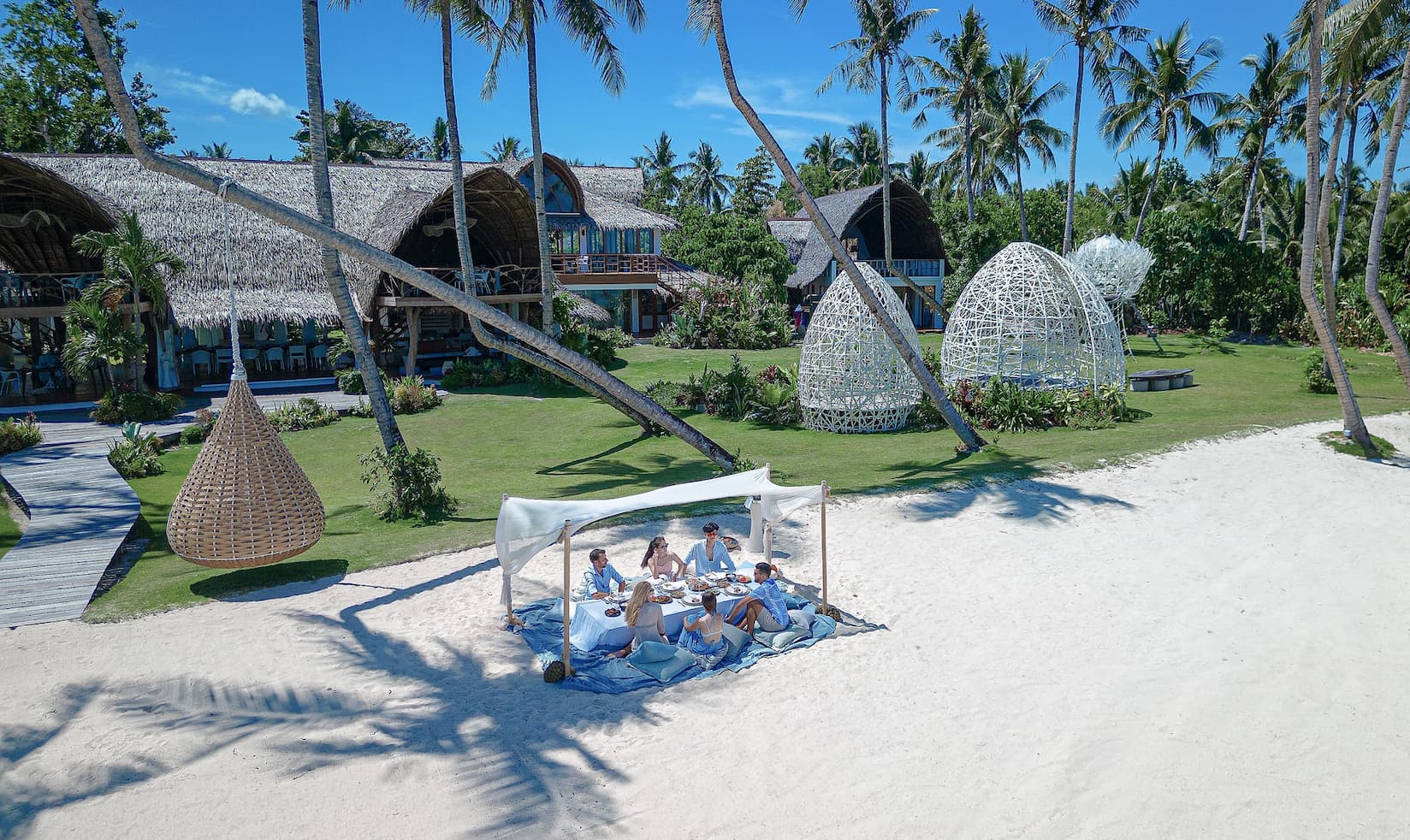

Meaningful Tourism Expert Skills and Experiences Matrix available
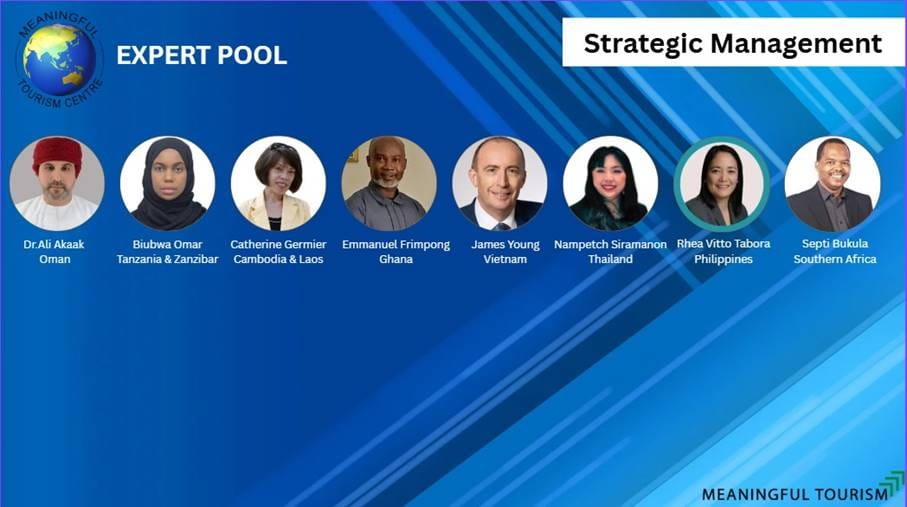
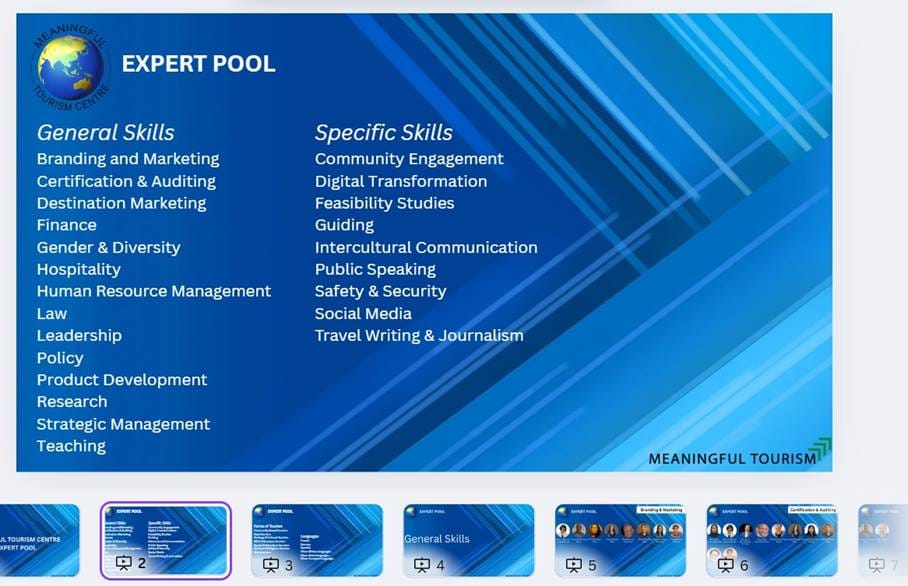

The Meaningful Tourism Centre is proud to be home of a growing community of experts, who are providing Meaningful Tourism Transformational Game Workshops around the world and who have a wide range of skills and experiences which can be used for the Implementation Support of Meaningful Tourism strategies in many different forms.
To make it easier for you to know in which fields, which forms of tourism, and which languages MTC experts are available for help, the Meaningful Tourism Expert Skills and Experiences Matrix has been developed. Thanks to our partner PATA, which has adopted Meaningful Tourism as its Vision for the Asia-Pacific region's tourism industry, we will officially inaugurate the matrix during the PATA Meaningful Tourism webinar on Tuesday, July 8, 2025. However, for readers of Meaningful Tourism Weekly, it will be available earlier on our website. PATA members will also find it in the Meaningful Tourism Economy PATA Resources Kit on PATA's website.
The community is continuing to grow. By the end of this month, there will be at least ten more trainers adding their skills and experiences to the matrix, covering practically all the necessary abilities needed for your successful development.
First Online Meaningful Tourism Transformational Game Workshop Featuring Ferrara/Italy
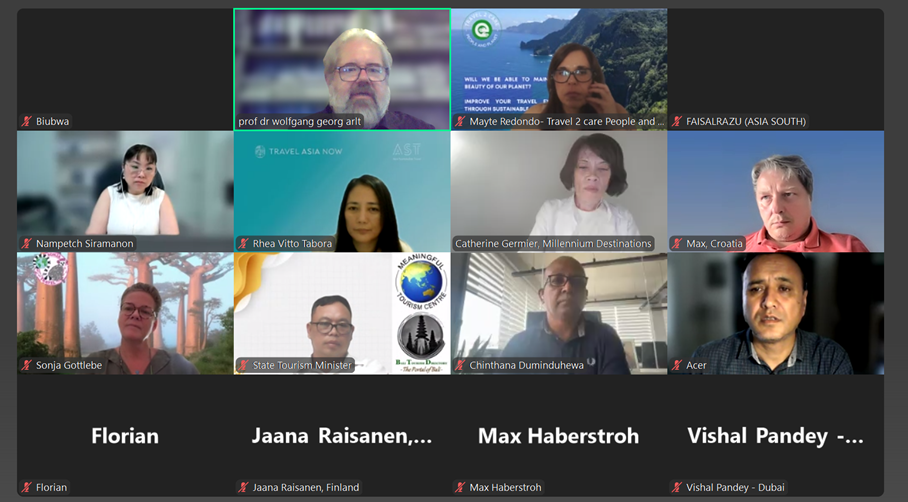
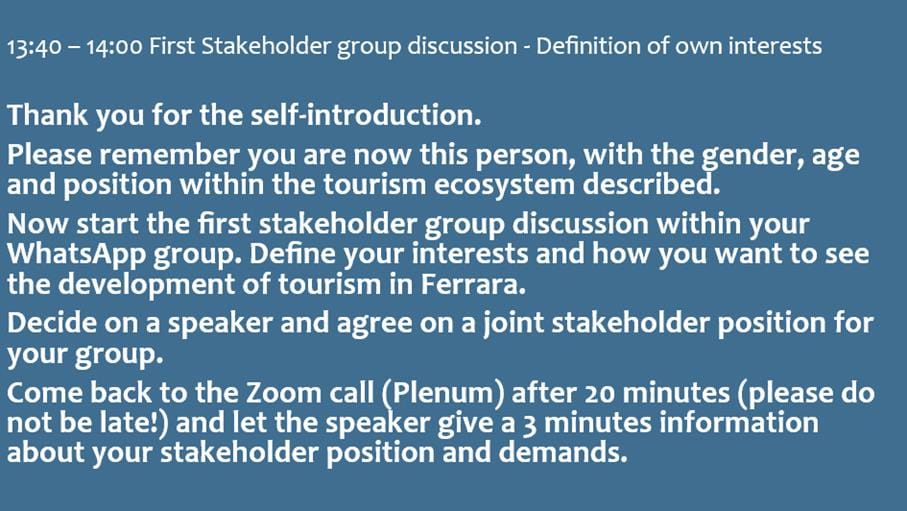
A few days ago, MTC conducted a Meaningful Tourism Transformational Game Workshop, using Ferrara as an example for developing a Meaningful Tourism-based strategy. Italy has started a campaign telling potential visitors that they have seen only 1% of Italy if they have only visited Venice, Florence, Milan, and Rome. Ferrara has many unique features, heritage, and the beautiful Po delta to offer, and is a UNESCO World Heritage city since 30 years. Still, it is "invisible" for most international visitors to Italy, bypassing it on the way from Milano to Venezia or to Bologna and beyond.
The training workshop was done with the inventor of Meaningful Tourism, Prof. Dr. Wolfgang Georg Arlt, as trainer and a group of the MTC trainers as participants, each playing a role of one stakeholder. An Indonesian professor found himself transformed to a female tourism minister of Emilia Romagna, a Cambodian regional development expert started as gay owner of a pizzeria which turned during the training into a restaurant offering local traditional cuisine, and a Finnish destination development expert expanded her under-visited art museum into a regional communication hub for tourists and locals alike.
Altogether, the training workshop proved again how, within one day, solutions for the alignment of all stakeholders' interests and KPIs to measure and manage them for a sustainable growth of the local tourism industry can be developed. It also helped the trainers to prepare even better to facilitate training workshops with practical results for you.
Looking for new trainers
The Meaningful Tourism Trainer community is growing fast.
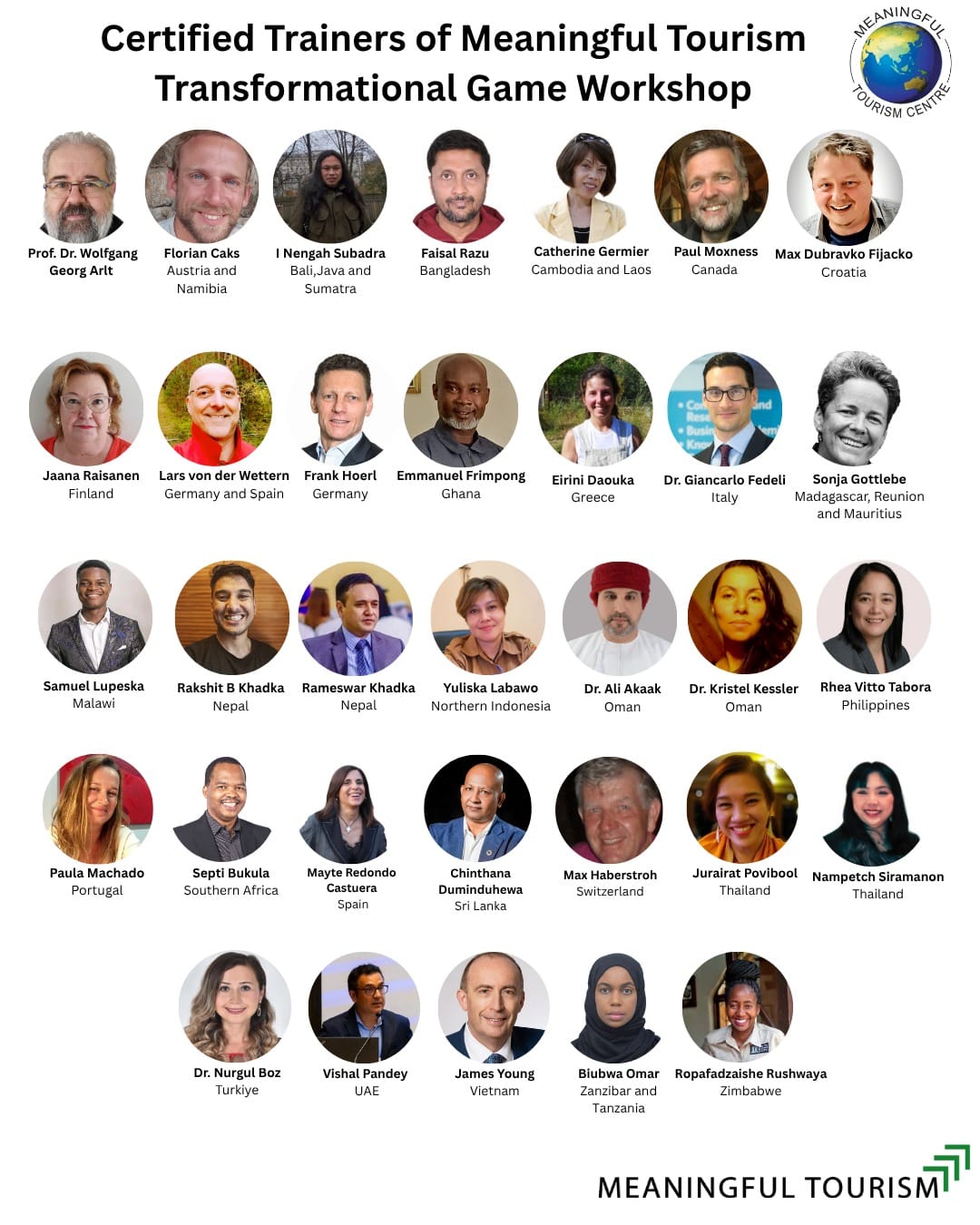
Last week, we certified another eleven trainers for the Meaningful Tourism Transformational Game Workshop, bringing the total number of certified trainers close to 40, covering all the areas coloured in dark and light green on the map below (borders, etc., are only indicative...).
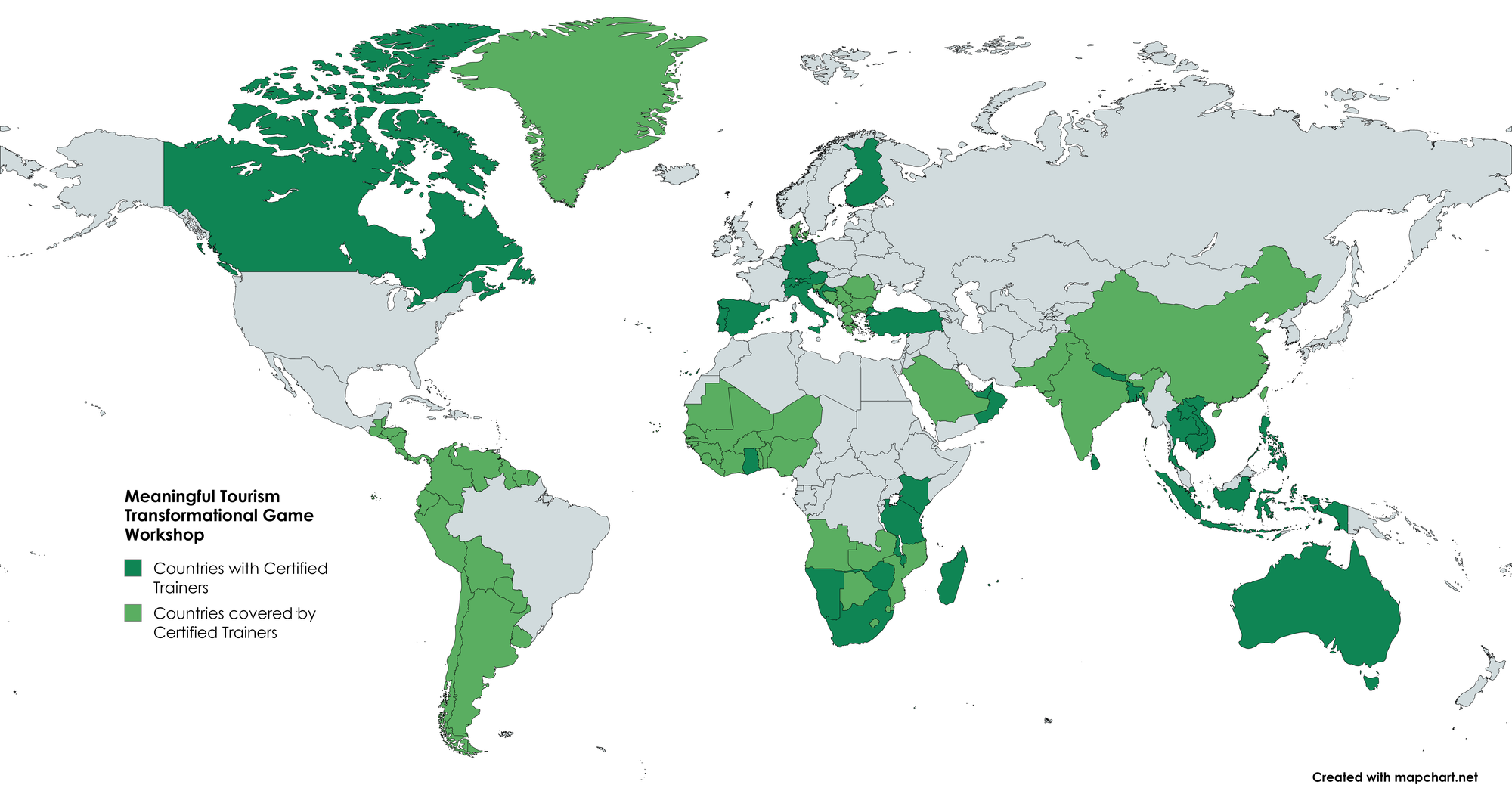
However, as can be seen, we are still only covering about half of the countries in the world.
Therefore, we are looking to increase our community further with persons who
a. live in a country not covered in dark green
b. have some experience in conducting training and/or lecturing
c. have a passion for sustainable tourism
We offer online certification workshops, all training materials, regular online meetings for all trainers, support with organisation, invoicing, etc.
Our community is the place to meet like-minded experts from many different fields and backgrounds, all united in the desire to support the development of a MEANINGFUL TOURISM ECONOMY, as PATA has already declared as the Vision of the organisation for the Asia-Pacific region.
Of course, training workshops are already now covered by trainers for any country if a training is requested by a destination, organisation or company, provided in more than ten different languages.
For individuals interested in participating, Meaningful Tourism Transformational Game Workshops are offered in August in Bangkok and in November in London. Details are provided in the Event section below.

Breaking News: The deadline for the World Sustainable Travel & Hospitality Awards 2025 has been extended to July 7, 2025.
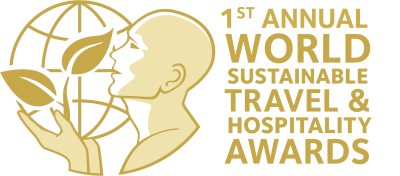
If your organisation or company is a pioneer in creating a net positive future for travel and hospitality, you can apply for one of the World Sustainable Travel & Hospitality Awards, handed out in different categories. The deadline has been extended to July 7, 2025, so there are a few days left to apply.
Tourism in a Warming World: A Wake-Up Call for the Industry
A finance expert from Pakistan published an insightful post on LinkedIn, providing a graph showing the interconnections of tourism and climate change.
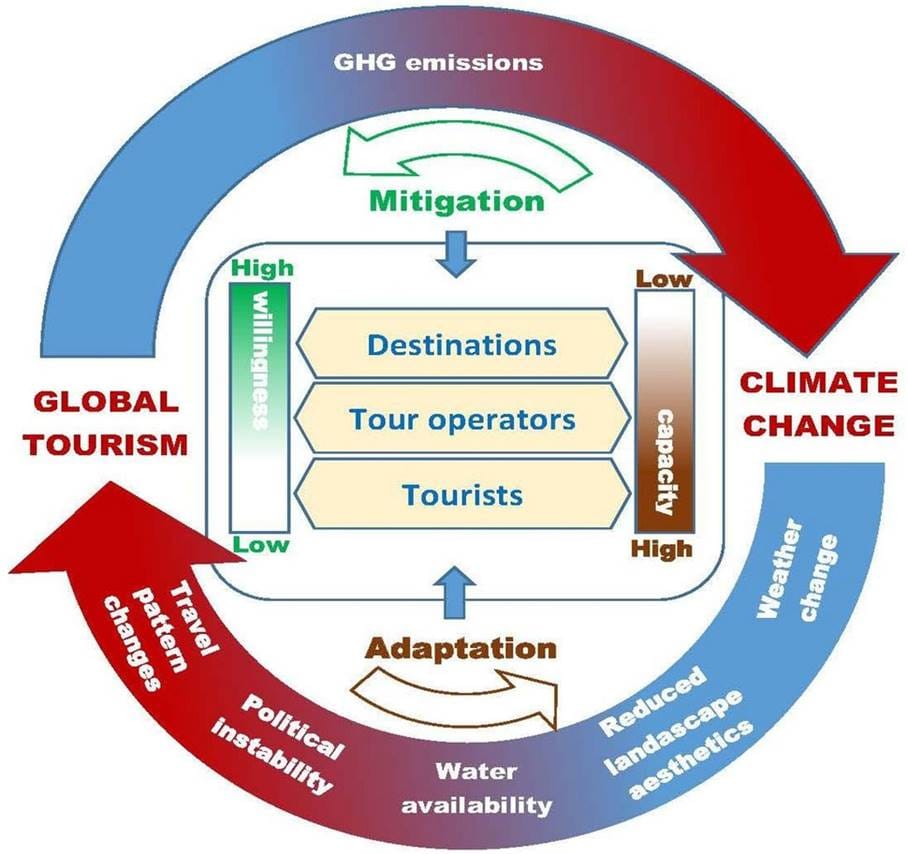
“Our planet is changing, and so is the very foundation of the travel experiences we offer. Global warming isn’t just an environmental issue—it’s a growing threat to the heart of tourism.
From melting glaciers in the Alps to rising sea levels swallowing tropical islands, climate change is reshaping the map.
The ripple effects go far beyond the landscapes. Tour operators, hotels, guides, and local communities—especially in climate-sensitive regions—are already feeling the strain. Flights are being rerouted due to extreme weather. Insurance costs are rising. And travelers are growing more conscious of their carbon footprint.
As tourism professionals, we have a duty not just to sell experiences—but to protect them. Let’s not wait for more signs. Let’s be the industry that leads by example.”
In a similar direction and with real action, a Spanish hotel group responds to the challenges of climate change, reflecting growing concerns that beachfront hotels may face mounting physical threats and financial exposure in the future.
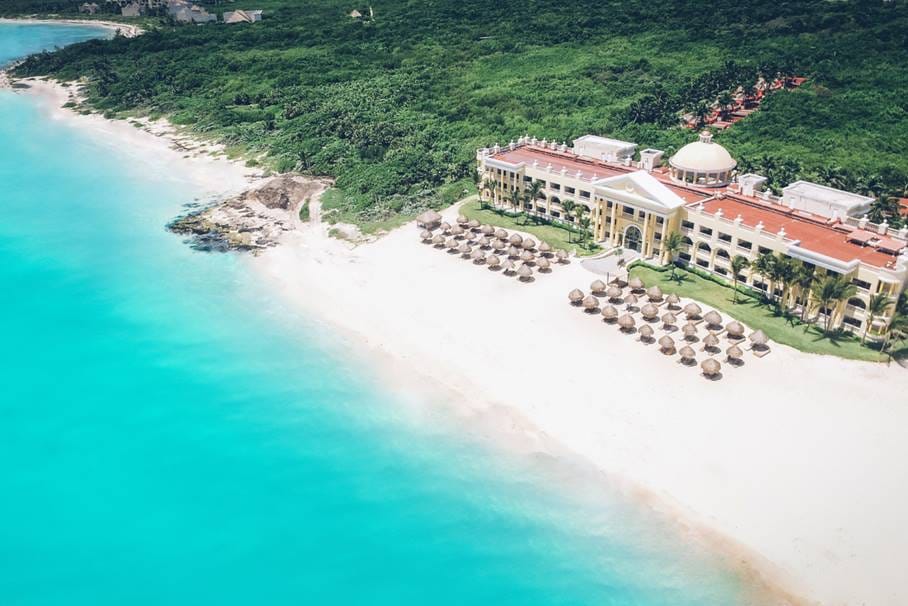
The Spanish international hotel group Iberostar has stated that climate change is the number one risk to its business and is calling for greater investment in the tourism sector to counter the impact. Iberostar, with more than 100 hotels in 15 countries, says it is intensifying efforts to protect its properties, especially in vulnerable coastal areas like the Caribbean.

PATA Webinar: A Meaningful Pacific Asia Tourism Economy
Organised by: Pacific Asia Travel Association (PATA) in cooperation with Meaningful Tourism Centre (MTC)
Date: Tuesday, July 8th, 2025
Time: 3:00 PM Bangkok | 9:00 AM London | 1:30 PM India | 4:00 PM Singapore | 6:00 PM Sydney
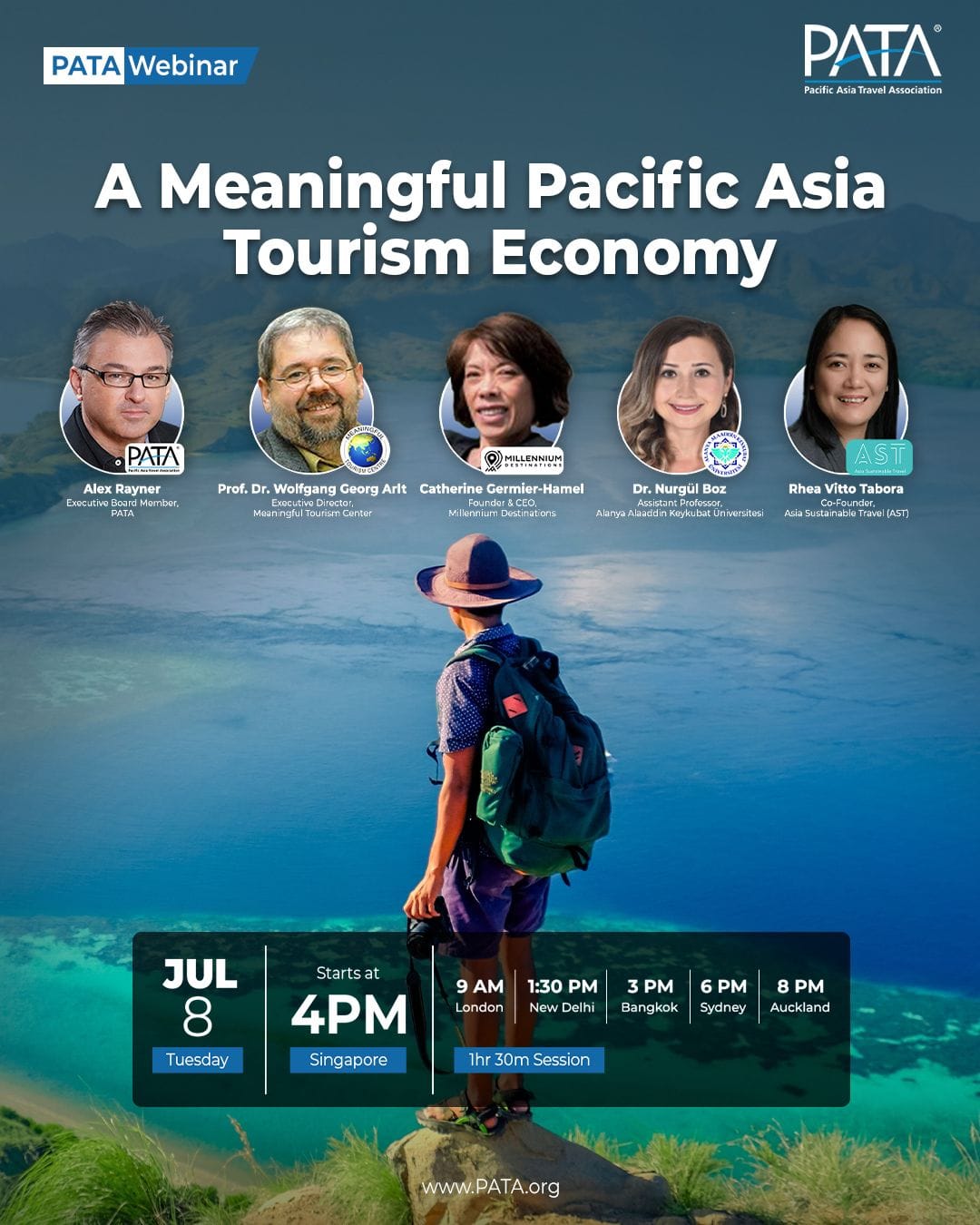
As tourism across the Asia Pacific region continues its robust recovery, there is a growing call for destinations to look beyond traditional performance metrics and adopt a more holistic, values-based approach to development. This means placing greater emphasis on community wellbeing, cultural preservation, visitor enrichment, and environmental stewardship.
Meaningful Tourism offers a strategic framework for this transformation—aligning long-term industry resilience with the needs, aspirations, and values of all stakeholders.
The phrase “A Meaningful Pacific Asia Tourism Economy” was officially adopted as the new Vision Statement of the Pacific Asia Travel Association (PATA) during the PATA Annual Summit in April 2025, marking a bold step forward in reimagining the future of tourism in the region.
“Tourism must evolve from a numbers game to a values-driven endeavour. Meaningful Tourism challenges us to redefine success—not solely by arrivals or spending, but by how effectively we serve communities, protect our heritage, and enrich lives. At PATA, we believe the future of tourism lies in creating shared value, and we are proud to work in partnership with the MTC Meaningful Tourism Centre to help guide this important transition across the Asia Pacific region.” - PATA Chair Peter Semone
To support this vision, the webinar will focus on key objectives that raise awareness, foster engagement, and inspire collective action.
Agenda [All times in Bangkok Time - ICT (GMT +7)]
15:00 - 16:30 A Meaningful Pacific Asia Tourism Economy: Webinar on Meaningful Tourism in partnership with the Meaningful Tourism Centre
15:00 - 15:05 Introduction
MC welcomes participants, introduces the presenters, and provides housekeeping notes and an overview of the webinar.
15:05 - 15:10 Welcome Remarks
Noor Ahmad Hamid, CEO, PATA
15:10 - 15:25 Keynote: Meaningful Tourism – Concept and Tools
Prof. Dr. Wolfgang Georg Arlt, Executive Director, Meaningful Tourism Centre
15:25 - 15:40 Keynote: PATA’s Vision of a Meaningful Pacific Asia Tourism Economy
Alexander Rayner, Executive Board Member, PATA
15:40 - 15:50 Meaningful Tourism: Making a Difference for Destinations, Communities, and Future Generations in Asia and the Pacific
Catherine Germier-Hamel, Founder & CEO, Millennium Destinations
15:50 - 16:00 Meaningful Tourism Transformational Game Workshops as Entry Points to Practical Action
Dr. Nurgül Boz, Assistant Professor, Alanya Alaaddin Keykubat University
16:00 - 16:10 Networks and Information Sources Supporting a Meaningful Tourism Development in the Asia Pacific Region
Rhea Vitto Tabora, Co-Founder, Asia Sustainable Travel (AST) | Founding Editor-in-Chief, Travel Asia Now
16:10 - 16:20 PATA Resource Kit and Activities for PATA Members Supporting the PATA Vision
Paul Pruangkarn, Director - Communications & Marketing, PATA
16:20 - 16:30 Q&A with Audience and Speakers
Meaningful Tourism Transformational Game Workshop at PATA Travel Mart, Bangkok
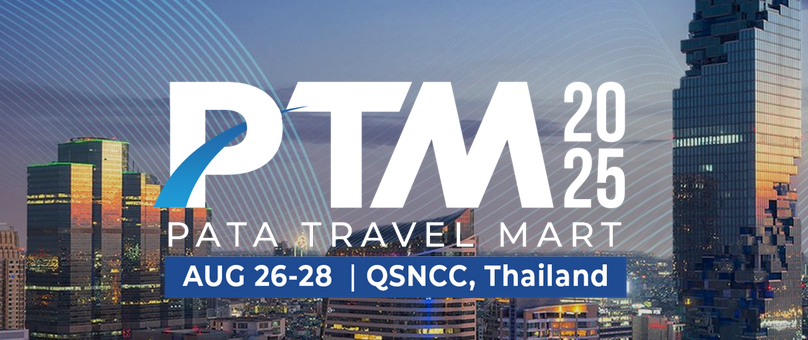
PATA Travel Mart (PTM) is one of Asia Pacific’s longest-standing international travel trade exhibitions featuring networking and contracting opportunities to help travel and tourism organisations access decision-makers, meet new clients, expand their networks, establish new relationships, and consolidate existing business partnerships.
PTM will take place at Queen Sirikit National Convention Center (QSNCC) in Bangkok, Thailand, from August 26 to 28, 2025. On August 26, one of the conference topics will be Meaningful Tourism and the way to a Meaningful Pacific-Asia Tourism Economy, as outlined in the PATA Vision statement. For details on participation, please visit PATA Travel Mart 2025.
The Meaningful Tourism Centre will host a special Meaningful Tourism Transformational Game Workshop on August 25, 2025, the day before the PTM 2025 begins. The workshop will run from 9:00 to 16:00 h and will be conducted by Prof. Dr. Wolfgang Georg Arlt FRGS FRAS, founder of the Meaningful Tourism Centre, together with the Meaningful Tourism trainer for Thailand.
There are only 30 seats available, so if you already know that you will attend PTM 2025, please ensure you arrange your schedule to arrive on time for the training workshop on Monday, August 25th. Book your seat now to enjoy the Super Early Bird fee. Venue: QSNCC Bangkok, details to be advised. Transport from/to the hotel or QSNCC can be arranged on request at a special rate.
Super Early Bird participation fee for bookings paid before July 15, 2025: USD 125 per person
Early Bird participation fee for bookings paid before August 15, 2025: USD 175 per person
Full participation fee for bookings after August 15, 2025: USD 200 per person
VAT included if applicable.
PATA members (including PATA chapter members) enjoy a 15% discount.
Two or more seats booked at the same time enjoy an additional 10% discount.
Please note that payments are non-refundable. However, a change of participant is possible without additional fee until one day before the training workshop.
The participation fee includes training workshop participation, a certificate of participation, one year of free access to all content, including the Meaningful Tourism Weekly Library reserved for paid subscription holders, coffee/tea, cookies, and a vegetarian and non-vegetarian lunch buffet.
For bookings, please contact us at office@meaningfultourismcentre.org.
Bookings will be closed once 30 reservations have been reached. Book today and enjoy the Super Early Bird fee.
Meaningful Tourism Transformational Game Workshop at World Travel Market, London
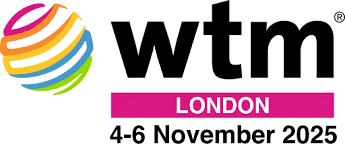
World Travel Market (WTM) in London is one of the must-attend annual events for key players in the tourism industry. The Meaningful Tourism Centre will offer a special Meaningful Tourism Transformational Game Workshop on the day before the start of WTM 2025, on November 3, 2025, from 9:00 to 16:00 hours. The workshop will be conducted by Prof. Dr. Wolfgang Georg Arlt FRGS FRAS, the founder of the Meaningful Tourism Centre.
There are only 30 seats available, so if you already know that you will attend WTM 2025, make sure you arrange your schedule to arrive on time for the training workshop on Monday, November 3, 2025.
Book your seat now and enjoy the Super Early Bird fee.
Venue: Central London, details to be advised. Transport from/to the hotel or Excel London can be arranged on request at a special rate.
Super Early Bird participation fee for bookings paid before July 15, 2025: 125 Euros per person
Early Bird participation fee for bookings paid before September 30, 2025: 175 Euros per person
Full participation fee for bookings starting October 1, 2025: 200 Euros per person
VAT included if applicable.
Two or more seats booked at the same time enjoy an additional 10% discount.
Please note that payments are non-refundable. However, a change of participant is possible without additional fee until one day before the training workshop.
The participation fee includes training workshop participation, a certificate of participation, one year of free access to all content including the Meaningful Tourism Weekly Library reserved for paid subscription holders, coffee/tea, cookies, and a vegetarian and non-vegetarian lunch buffet.
On the evening of November 3, 2025 there will also be a (self-paid) dinner followed by drinks with an opportunity to network with participants and to meet several of the Meaningful Tourism trainers from different countries.
For bookings, please contact office@meaningfultourismcentre.org.
Bookings will be closed once 30 reservations have been reached. Book today and enjoy the Super Early Bird fee.
About Meaningful Tourism Weekly
Meaningful Tourism Weekly, published every Thursday by the MTC Meaningful Tourism Centre (London and Kathmandu), recently partnered with Travel Asia Now, led by Rhea Vitto Tabora. This collaboration enhances the newsletter’s professional production and distribution, bringing added value to our readers.
Each issue features the Meaningful Tourism Weekly Editorial, updates on MTC activities, a Best Practice example, a portrait of an MTC-certified trainer, news about upcoming events, and occasionally additional op-ed pieces from guest authors. Carefully selected news items, including videos and podcasts, are also included, along with links to their original sources in the Meaningful Tourism News section.
Subscription to Meaningful Tourism Weekly is free, with the addition of a paid content section that includes a library of surveys, exclusive articles, conference presentations, and statistical data, offering subscribers invaluable resources.
Sponsorship opportunities are available for those interested in supporting this initiative.
For more information about the Meaningful Tourism Centre's trainings, market research, product adaptation, consulting services, conferences, strategy development, and marketing, visit our website or email us at info@meaningfultourismcentre.org.

